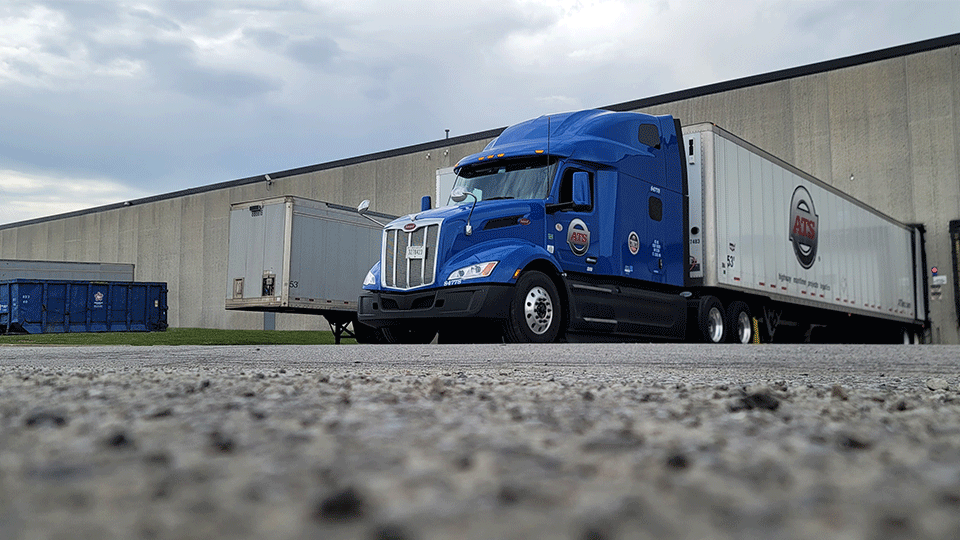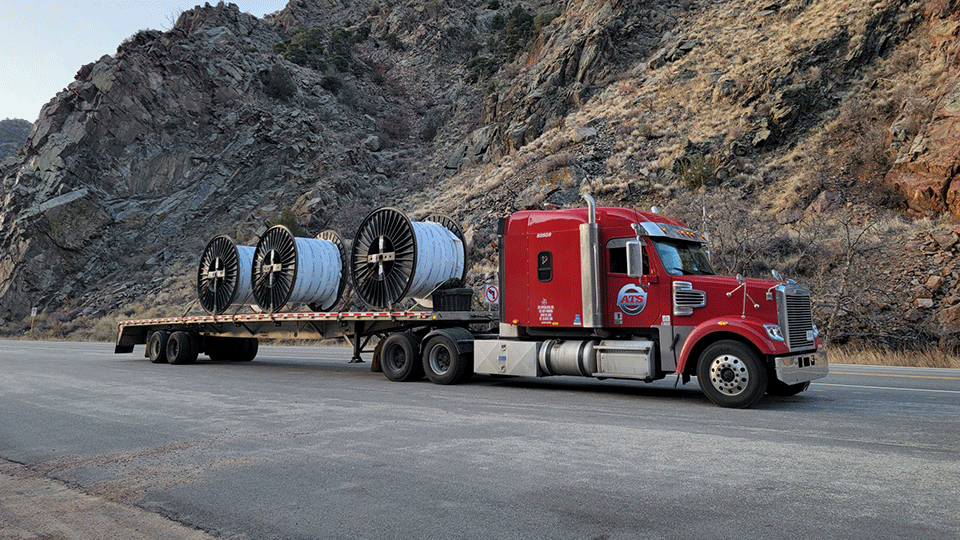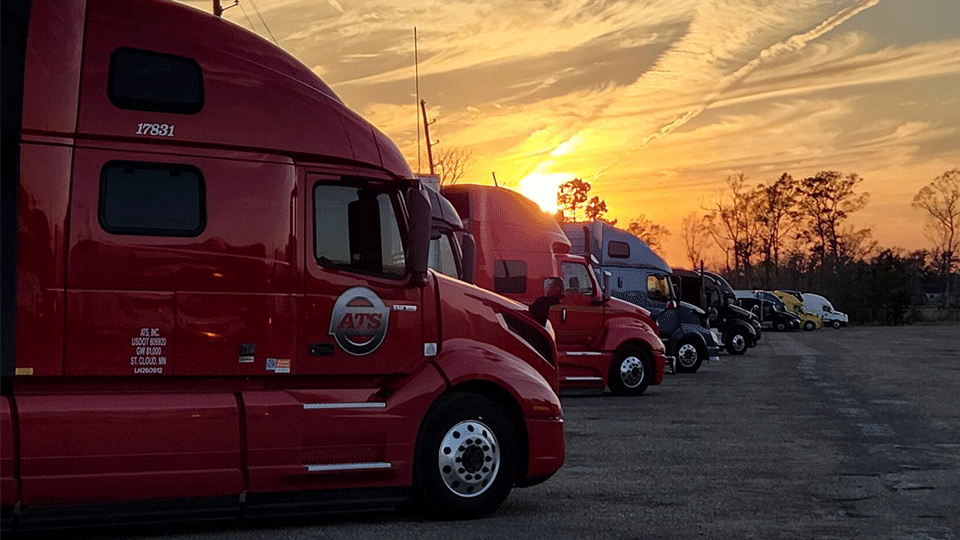
With hundreds of thousands of for-hire trucking companies in the U.S., businesses of all sizes don’t have to look far to find a suitable partner to manage their transportation logistics.
But in an industry with no shortage of options, choosing the right partner isn’t as simple as it may seem — and choosing the right service model can easily become an afterthought.
Dedicated transportation is a service model that can, in the right circumstances, be especially transformative for both small and large companies seeking increased efficiency and reliability.
Here at Anderson Trucking Service (ATS), we get questions all the time about the services we provide — one of which is dedicated transportation services — and how they fit within a modern shipping supply chain.
Our seven decades of experience offering a variety of service levels to a diverse portfolio of customers has given us a uniquely well-rounded perspective on dedicated transportation’s pros, cons, and best use cases.
In this article, we’ll answer all your baseline questions about what dedication transportation is and the potential advantages (and disadvantages) of its use.
Along the way, we’ll also offer our expert tips on how to choose a dedicated transportation provider. Let’s get started!
- What is dedicated transportation?
- Dedicated transportation pros and cons
- How to choose a dedicated transportation provider
What is Dedicated Transportation?
Dedicated transportation service is a logistics solution in which a shipper company is allocated a fixed portion of a trucking company’s fleet for a contracted period.
In this arrangement, the carrier commits to “dedicating” a certain number of trucks to haul the customer’s freight for the duration of the contract.
A shipper who uses dedicated transportation may also be likewise “dedicated” to the carrier in question, awarding them all or a significant portion of their freight.
Dedicated transportation services, unlike standard trucking services, are typically offered over an extended contract period. Common contract lengths range from three to five years.
Dedicated contracts not only provide reliable capacity to the shipper for the duration of the contract, but also allow the carrier to focus that segment of its fleet entirely on servicing one customer rather than many.
In turn, the carrier enjoys greater scheduling consistency, which often translates to a higher level of service quality thanks to fewer competing priorities.
In general, dedicated service isn’t offered to companies with regular over-the-road (OTR) transportation needs in excess of 400 miles per shipment. Dedicated transportation is best suited to short-mile shipments covering 250 miles or less.
As such, dedicated transportation is a popular solution for the middle miles of a shipper’s supply chain — like those between a distribution center and a retail store, for example.
Dedicated service can provide a number of benefits for businesses, from increased efficiency to greater control. Like any service model, it also has its disadvantages and can be a poor fit for certain needs.
Let’s take a closer look at the pros and cons of dedicated transportation service next, to give you a better idea of whether it’s the right model for your needs.

What Are the Advantages of Dedicated Transportation?
For companies that align with the service model’s focused approach and want or need to secure consistent pricing and capacity in the long term, dedicated transportation service can offer many upsides.
The top four pros of using dedicated transportation services are:
- Predictable, consistent pricing
- Guaranteed capacity
- Optimize alongside your carrier
- Greater visibility
1) Predictable, Consistent Pricing
Companies typically commit to dedicated transportation services for several years at a time. These agreements establish an inbound capacity cadence at a set price.
While these rates are subject to change as needed to keep up with fluctuations in the transportation marketplace, in general, they remain relatively stable and predictable for the contract term.
This gives shippers a ballpark estimate of what their freight spend will look like well into the future, allowing them to budget for these expenses months in advance.
2) Guaranteed Capacity
While something can always fall through — there are a lot of factors out of everyone’s control in the business of transportation — dedicated services all but guarantee capacity for the shippers involved.
In a world where only death and taxes are guaranteed, how is that possible?
Well, in dedicated transportation contracts, shippers are essentially outsourcing a portion of their supply chain to their dedicated carriers. For carriers, this raises the stakes.
Failing to meet the contracted capacity requirements could result in the loss of that highly-desired long-term contract.
Carriers are therefore highly motivated to have dependable capacity for their dedicated customers — it’s the service the entire agreement is predicated upon.
Luckily, the nature of dedicated service is such that your carrier will have greater visibility into your production and shipping schedule, so they’ll be able to align your calendar with that of their drivers.
You also won’t have to host a bid or tender out freight every time you have a shipment ready to move. Because your dedicated carrier has an intimate understanding of your capacity needs and schedule, they will have capacity secured for you in advance.
3) Optimize Alongside Your Carrier
In most instances, companies work with a variety of transportation providers, hand-picking which ones are awarded shipments on an individual or grouped basis.
This process is effective but tedious, requiring oversight and patience as each provider learns a business’ processes and cadence.
Depending on how frequently you onboard and off-board transportation companies, the revolving door of carriers can quickly become difficult to manage, making it hard to gain efficiencies.
Onboarding a carrier as a dedicated transportation provider can help shippers avoid this common pitfall. Once your carrier is fully onboarded, they’re with you for the duration of their contract — no turnover, no transition period, no more revolving door.
The carrier essentially becomes an in-house (albeit technically outsourced) fleet, with a depth of company-specific supply chain knowledge that rivals your own team’s.
By having transportation solutions that are a seamless extension of your business, you can eliminate many of the inconvenient (and inefficient) realities of maintaining multiple carriers for your freight and achieve a more optimized flow of operations.

4) Greater Visibility
Dedicated transportation solutions can streamline more than supply chains; they can also help shippers streamline their data for heightened visibility into the transportation portions of their supply chains.
With a dedicated fleet of vehicles, a familiar point of contact, and fluency (or even outright integration) with their provider’s load tracking systems, companies can easily track each shipment and leverage detailed reports on delivery times and performance.
The data insights therein can help shippers make more informed decisions about their transportation needs and processes, leading to greater optimization and efficiencies moving forward.
This level of visibility is much harder to achieve with a larger network of providers, all of which are moving freight with less regularity than if they were providing a dedicated solution.
As the only data stream in play (or one of just a few), a dedicated transportation solution offers a clearer, more insight-rich overview of shipping activities that companies can leverage to their operational benefit.
Related: The Pros and Cons of Freight Shipper Customer Portals
What Are the Disadvantages of Dedicated Transportation?
Let’s say your company’s transportation needs include coverage for domestic shipments traveling 250 miles or less per run. Dedicated transportation may be a viable solution for you — and it may not be.
Although the upsides may be hard to dispute in many situations, dedicated transportation services aren’t right for every company. In fact, there are a few downsides to this logistics service model:
- Not a fit for low freight volumes
- Amended contracts and rates may be necessary
- Limited flexibility
1. Dedicated Service Isn’t a Good Fit for Low Freight Volumes
When a company has lower freight volumes — fewer than one outbound load per day — dedicated transportation service doesn’t make sense for either party.
From a carrier’s perspective, dedicated service is only attractive if there’s dependable volume for their drivers to rely on. If the freight volumes don’t justify a dedicated level of service, convincing a carrier to tie up a portion of their driver fleet will be a hard sell.
For shippers, one of the benefits (if not the most compelling benefit) of dedicated service is the cost-efficiencies gained on high-volume contracts.
When volumes are high and carriers are moving freight at scale, they can optimize their schedule of trucks and drivers.
Trucking companies want to keep trucks loaded and moving in this manner, so in exchange for these operational efficiencies, carriers often relax their pricing a bit for dedicated contracts.
But if you can only guarantee a few shipments per period, tying up your carrier’s capacity for an extended period will likely cost more.
In those situations, it makes more sense to tender your shipments on an intermittent basis — here are five common ways to do so.
2) Amended Contracts and Rates May be Necessary
Freight prices fluctuate slightly from day to day, but generally speaking, a small change in the spot rate market doesn’t impact contract rates like those associated with dedicated service.
With that said, when something major shifts in the national or global economic marketplace, transportation pricing — including contract rates — can change in response.
While these adjustments typically cycle through on a two- to six-year cadence, they can happen at any time. As a result, if spot rates change significantly during your dedicated transportation service contract, you may need to revisit your rates.
As a rule of thumb, expect these conversations to occur whenever your provider is wary about their ability to service your freight at the current contract rate.
Likewise, if you’re struggling to reconcile the rates you’re paying with drastic changes in the market, your contract may need to be revisited and amended.

3) Limited Location and Service Type Flexibility
A trucking company’s service area is restricted to where its drivers are concentrated, called its driver domicile.
ATS’s dry van division, for example, is best at serving areas east of the Mississippi River; most of our dry van drivers live in that region.
As a result, if you have multiple locations spread across the U.S., you likely won’t be able to utilize a single, dedicated carrier’s services for all of them.
This makes dedicated service a less viable option for companies that serve several regions — though having one dedicated service provider per region (a Midwest carrier, a Southern carrier, etc.) is a strategy many national companies employ.
This goes to the importance of understanding any prospective dedicated carrier’s service proficiencies.
As you’re potentially agreeing to make this provider your single-source transportation partner, you should make sure their service proficiencies align with all your needs.
If a portion of your freight calls for a certain service, such as specialized trailer types or equipment requirements, confirm that your prospective dedicated provider has those capabilities.
If they don’t, they’re likely not the right dedicated solution provider for you. Your best-fit provider will have a proven track record of providing all the services you require on a dedicated basis, not just some of them.
How to Choose a Dedicated Transportation Provider
Regardless of which carrier you ultimately choose, you need to do your due diligence to ensure they can reliably offer the high level of service you want and need.
After all, this is the carrier you’ll be using every week for years. You owe it to your company and your customers to confirm they have the capabilities, operational skills, and industry expertise to follow through on their end of the agreement.
To that end, here are three of our best tips for selecting the right dedicated carrier:
- Review their track record
- Verify their asset and driver locations
- Ask for an onsite operational presence
1. Review their Track Record
Before committing to a dedicated freight carrier, it's crucial to thoroughly assess their track record to ensure reliable service.
A carrier’s history gives insight into their dependability, safety standards, and ability to consistently meet both capacity requirements and delivery timelines — key factors in protecting your supply chain’s integrity.
Start by reviewing their customer feedback. Focus on long-term clients, as they provide valuable insight into the carrier’s reliability and service quality over time.
You can even ask the carrier to connect you with current or past dedicated customers so you can have a one-on-one conversation about their experience and ask any specific questions you may have.
Check for any recurring issues, such as delays or damaged freight, as these can signal potential risks. Don't hesitate to ask the carrier directly for safety records, on-time delivery metrics, and other performance data.
By taking the time to conduct a review of any prospective dedicated carrier’s track record, you position yourself and your company to make a well-informed decision and increase the likelihood of selecting a carrier that aligns with your needs and expectations.
2. Verify Their Asset and Driver Locations
For a dedicated service arrangement to work well, your carrier must have an appropriate number of trucks, equipment, and drivers in your area.
Ask your prospective carrier to confirm the location(s) of each, as well as the number of trucks expected to be allocated to you per week or month.
Check if the carrier has any reservations about their ability to meet these capacity needs reliably. If they do, talk those out and take time to compare them realistically to your known requirements before making a decision.
Finally, you’ll want to make sure the carrier you choose can provide surge capacity for peak periods and unexpected bursts of business. A safe surge capacity estimate is about 15-20 percent more capacity than your “normal” requirements.
3. Ask for an Onsite Operational Presence
When you onboard a dedicated transportation provider, you’re essentially hiring that carrier to manage your company’s trucking logistics.
Scheduling inbound trucks, overseeing route planning, and providing customer service will be much easier if your carrier has the capacity to house a member of their team at your location or facility.
Having an operational presence on site who acts as an extension of your team helps to ensure quick response times, informed decision-making, and the smoother facilitation of your transportation supply chain overall.
As advantageous as this arrangement can be for both parties, it’s not always feasible for carriers. If an onsite operational presence makes sense for your business, prioritize it early in your carrier selection process.
If your top choice carrier can’t place a representative in your office or facility, talk with them about their options for oversight and visibility.
Many carriers offer customer portals that give shippers and their carrier representatives a platform through which to communicate about their shipping activities.
This can be a solid compromise for shippers that prefer the hands-on approach and availability of a boot-on-the-ground representative.
Gain Efficiencies With or Without Dedicated Service
Dedicated transportation services are a great fit for a lot of companies. These services help businesses streamline their supply chains by giving them predictable expenses and a single source of capacity.
On the other hand, dedicated service can limit your flexibility, and the rate you lock in at the beginning of your contract might not get the job done a year or two later, forcing you to amend your contract.
If you decide this dedicated transportation service is worth pursuing for your business, make sure to vet your potential dedicated carrier’s track record, confirm their asset and driver locations, and request an onsite representative, if possible.
When it comes to gaining efficiencies in your transportation supply chain, you have a lot of options, and dedicated trucking service is only one of them.
Here are five things you can do right now to gain logistical efficiencies in the future. This article breaks down the foundation of a smooth transportation supply chain into manageable steps.
You’ll walk away feeling confident in your ability to take small actions today that will make a big impact on your operations in the weeks and years to come.




